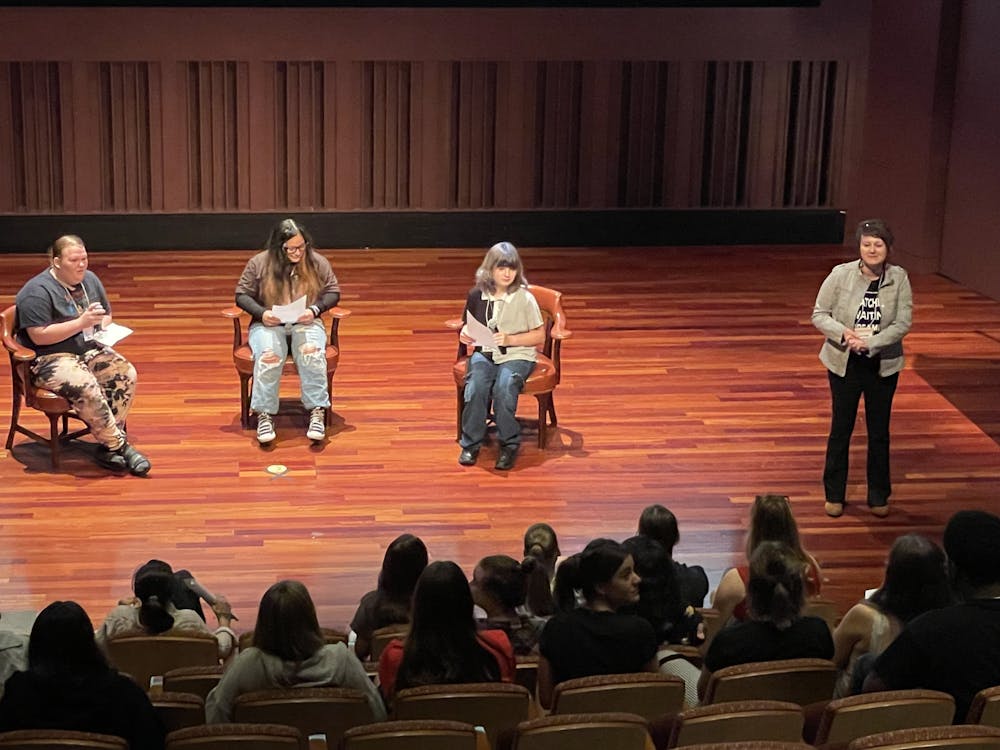Tammy Schwartz, director of the Urban Cohort, often gets “the chills” when she talks about her work.
“I had a real passion for how do we help our Miami students walk a bridge across differences and start to build relationships [and] to start to listen to other people's stories?” Schwartz said.
Schwartz has taught at Miami University for more than 20 years and currently teaches the senior seminar for the Urban Cohort program. She is both an instructor and director, a role she came into in 2008.
After Schwartz got her Bachelor of Science in elementary education and teaching at the University of Cincinnati, she went back and got her Master of Arts in literacy and her Doctorate of Education in literacy.
Schwartz went back to school after she noticed something missing in her teaching methods classes. She thought professors were good at teaching methods and theory, but once students went into urban communities, they would assess from a domestic perspective and perceive it as dangerous.
Schwartz’s dissertation work was in youth participatory action research, or YPAR, which is a method of research that works to teach young people how to find solutions to issues that affect themselves and their communities. She said she has seen some “amazing things with kids and that kind of work” over the years.
“Not only are they being challenged with the research, [but] they're [also] being challenged like they're having academic rigor,” Schwartz said. “They’re also enacting their civic agency, as they respond to an issue in their community or school.”

Schwartz's end goal is to create a welcoming community where everyone has the resources they need to thrive.
Schwartz grew up in poverty and remembers what it was like for teachers to visit her community.
“Even though I was in seventh or sixth grade, I couldn't articulate it,” Schwartz said. “But sensing like, why do they get out of their cars and come into the school right away and they leave right away? Are they afraid? Do they not feel comfortable here?”
When Schwartz first started at the cohort, she spent much time working at Rothenberg Preparatory Academy in Cincinnati, building trust and relationships with community members. To build those connections, she said she would go in one day a week and help wherever they needed her. From there, she helped develop the program from the Urban Teaching Cohort to the Urban Cohort, shifting to a focus on gaining community-based skills, rather than just teaching skills.
Debra Olabode, a junior social work and international studies double major, got a taste of the program in her first year at Miami. She is on the Urban Cohort Student Advisory Board and has helped Schwartz present in Luxembourg to Career Academy participants.
Enjoy what you're reading?
Signup for our newsletter
“My advisor, who knew the person who taught the cohort at the time, was like, ‘I think you'll be good for this,’” Olabode said.
Olabode recalls a time when she and other cohort members got to create a mural at Peaslee Neighborhood Center in Cincinnati of two workers who had died. The center provides an environment for community education and social advocacy.
“It was like a paint-by-number and it was a painting of the two community members that everyone participated in and then we presented at our retreat and some of the community members cried,” Olabode said. “I felt so passionate to do that.”
Olabode notes how authentic and vulnerable Schwartz can be when talking about her work.
“Sometimes you see her [be] like, ‘Oh, just give me a moment,’ because it never gets easy to be vulnerable,” Olabode said. “And I think she acknowledges that.”

Schwartz has taught at Miami University for more than 20 years and currently teaches the senior seminar for the Urban Cohort program.
Melinda Barman, a junior majoring in chemistry, German, and adolescent and young adult science education, is the board coordinator for the Urban Cohort Student Advisory Board. During her time in the program, she has really enjoyed getting to work with members of the community.
“Peaslee Neighborhood Center has become, honestly, like a second home to me,” Barman said. “They're so loving and they have fought so long for their community that it's powerful to be around.”
Barman said that Schwartz is a ray of sunshine in everyone’s life.
“She has so much love to give and it's powerful to be around someone that has that much hope and optimism and fierceness in her fight,” Barman said.
Schwartz has a deep passion for this line of work, and the people around her are able to see it.
“She has this classic saying that she gets goosebumps all the time,” Barman said. “She's like, ‘Oh my gosh, I'm just getting goosebumps,’ and she gets them constantly.”
To Schwartz, change takes a long time.
“Sometimes you take two steps forward and one step backward,” Schwartz said.
However, she does have an end goal in mind.
“All human beings are living and thriving in communities in which they are respected and honored,” Schwartz said. “And [they] have the resources that they need to thrive.”




